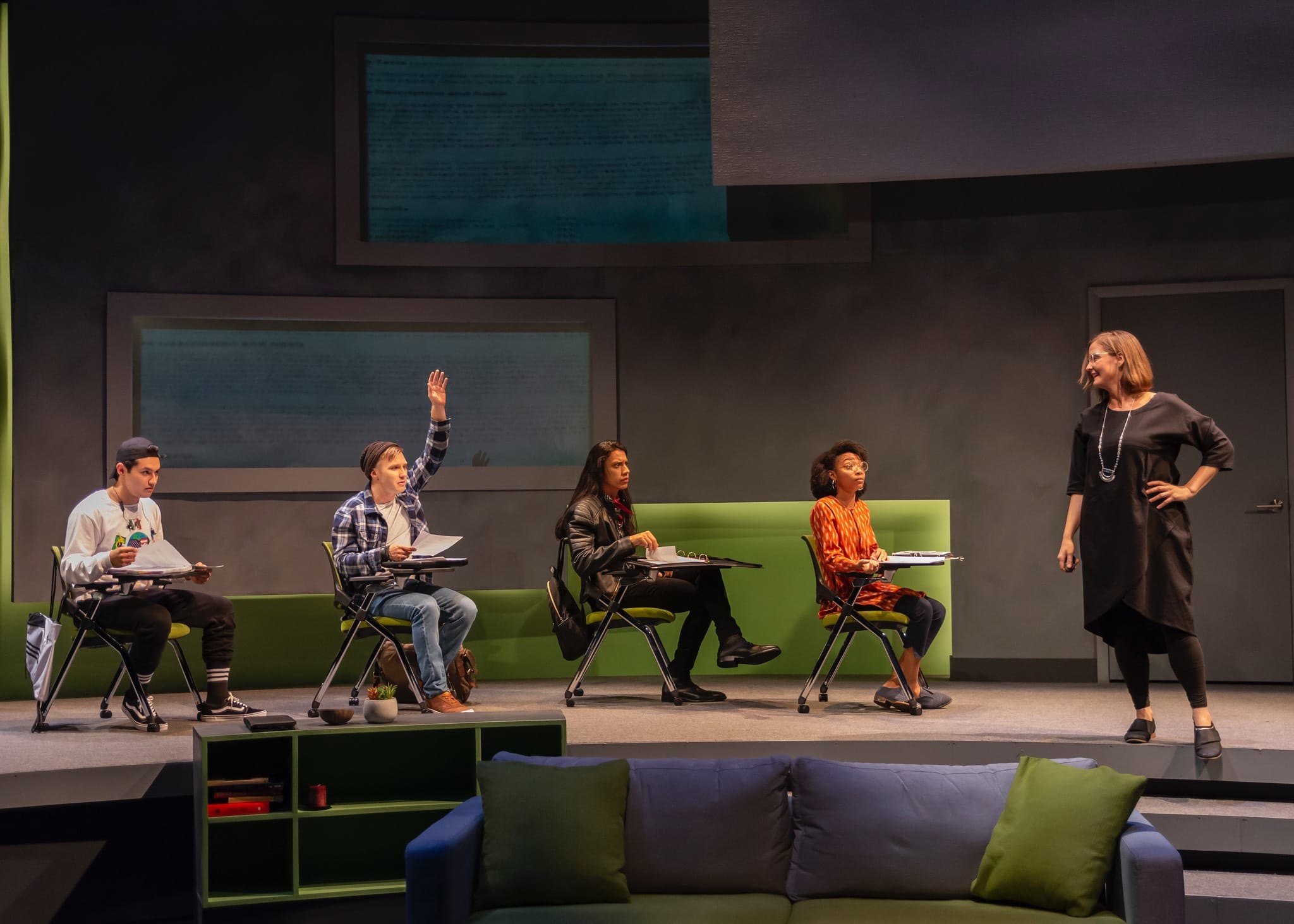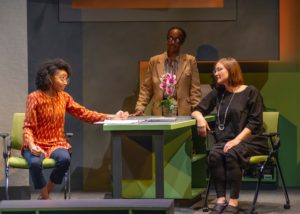Canadian playwright Norman Yeung’s Theory, in its American premiere at Mosaic Theater, seeks to be, in the words of Mosaic’s press release, “a hot button play for our digital moment.”

Yeung packs a lot of ideas into the 90-minute one-act format so characteristic of our theatrical moment. There’s academic freedom, freedom of expression, intersectionality, the promise and threat of wide-open electronic communication, fear of giving offense and of being offended, trigger warnings, discarding old norms and hierarchies and the intellectual and social chaos that may follow, the difficulty of maintaining personal and institutional stability in an ever-more unstructured world. “Disruption,” a term beloved of economists these days, here applies across the board to lives in the world of academia.
Make no mistake, this play lives and breathes in the hothouse intensity of the corner of the academy devoted to cutting-edge approaches to the humanities, as opposed to more prosaic studies of STEM, health care administration, international relations, law enforcement, etc., that likely occupy the attention of a majority of faculty members and students.
When we first see the play’s central character, Isabelle (Musa Gurnis), a junior professor teaching a film class, she tosses out not only the standard curriculum (literally) but also the notion of professorial authority, and as Mosaic Artistic Director Ari Roth suggests in a program note, authorial intent. Everyone is to have an equal opportunity to speak with their own voice on an unmoderated online discussion board as one voice isn’t more important than another.
Gesturing melodramatically, speaking with an assumed equality and familiarity with her students, dogmatically asserting the subversion of standard dogma, Isabelle could easily be seen, especially in the play’s early scenes, as a figure in a right-wing satire of the follies of liberal universities.
Director Victoria Murray Baatin chooses to have Isabelle address many of her comments about film straight out toward the house, an awkward device perhaps intended to draw in the audience as part of the class, or at least to suggest that it consists of more than the four students lined up in seats upstage right. Costume designer Danielle Preston puts Isabelle mostly in a baggy black dress, possibly intended to show the character’s indifference to appearances.

and Musa Gurnis in ‘Theory.’ Photo by Christopher Banks.
The four students have the carefully constructed diversity of a platoon in a World War II combat movie. There’s a long-haired gay man, Davinder (Benairen Kane); a Hispanic man, Jorge, who, as played by Camilo Linares, may have working-class roots; a mixed-race woman, Safina (Tyasia Velines); and a white guy, Richard (Josh Adams), who may have watched a few too many Jordan Peterson videos. With the exception of Safina, who in Velines’ performance shows vulnerability, spirit, and quirky humor, the student characters feel underwritten. They exist more as vehicles for the script’s welter of ideas than as fleshed-out characters.
Being no more mature than undergraduates generally, the class members take the online discussion in progressively wilder, more vulgar, more insulting, and more threatening directions. Given that racist and fascist films (Birth of a Nation, Triumph of the Will) occupy a good deal of the class discussion, it is perhaps not surprising that it is not long before the N-word raises its ugly head online, directed specifically at Isabelle’s African-American wife, Lee (Andrea Harris Smith). Things spiral from bad to worse, as Isabelle becomes obsessed with the online postings, to the detriment of her mental health.
Isabelle, and even the more experienced Lee, are taken aback by the virulence of the online content. Why? Though no one wants to be the subject of them, trolling and flaming are well-known phenomena, and after Pizzagate and Gamergate, the potential viciousness and dangerousness of the internet are not news.
The political soon becomes personal, as the rising tensions take a toll on the relationship between Isabelle and Lee. Things are already fraught between them, principally because Isabelle does not fully share Lee’s enthusiasm about having her younger wife bear a child through in vitro fertilization. Their scenes together are not fully convincing. Three years into their marriage, their connection already seems humdrum. How did these two people fall in love in the first place? The interludes of domestic drama slow the evening’s pace.
The script’s strongest moments are exchanges between Lee and Isabelle, and later Isabelle and her department head, Owen (Tony K. Nam, in a fine one-scene role), about the need to balance freedom and disruption with structure, prudence, and ground rules.
Given a script featuring movies and the internet, visuals play a key role in the presentation. Dylan Uremovich’s projections are the production’s outstanding feature, both with respect to film clips and the appearances of texts and gifs as characters communicate online. Shown onto Daniel Ettinger’s spare, two-level, curvilinear set, with different horizontal as well as vertical elements, the fragmented look of the projections is an effective metaphor for the themes of the play. David Lamont Wilson’s sound design, with precisely timed computer beeps, pings, and voices, as well as ominously percussive short between-scenes interludes, was equally effective.
There’s an old theater tradition that, if someone asks you what you thought of a play that had merit but didn’t altogether work, you politely say that it was “interesting.” Both in this sense and because its themes and issues are well worth extended conversation (Mosaic is hosting an excellent series of post-show discussions throughout the run), Theory is an interesting show.
Running Time: Ninety-five minutes, with no intermission.
Theory is playing at the Atlas Performing Arts Center, 1333 H Street, NE, Washington DC, through November 17, 2019. For tickets, you can call the box office at 202-399-7993 extension 2, or go online.




